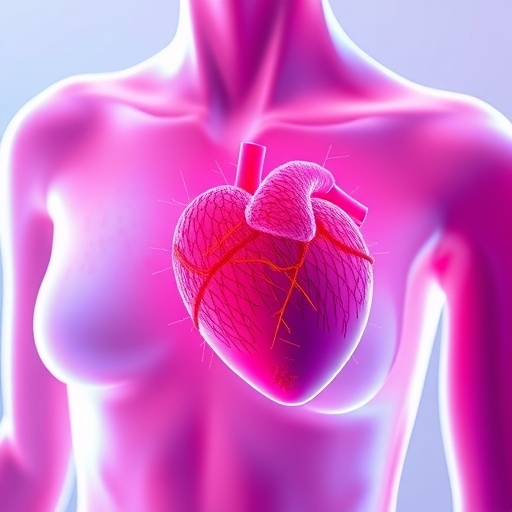As breast cancer survival rates continue to advance, with more than 4.3 million women in the United States currently living after a breast cancer diagnosis, the landscape of post-treatment care is evolving. Over the next decade, this population is projected to swell by an additional million survivors, bringing increased attention to long-term health outcomes beyond cancer itself. Among these concerns, cardiovascular health has risen to the forefront of oncology survivorship care, reflecting the complex interplay between lifesaving cancer therapies and their potential impact on cardiac function.
Historically, oncologic treatments integral to breast cancer care—such as anthracycline-based chemotherapies and targeted agents like trastuzumab (Herceptin)—have been linked to cardiotoxic effects. These therapies can impose significant stress on cardiac muscle, occasionally resulting in heart failure or cardiomyopathy. Contemporary clinical standards emphasize vigilant cardiac monitoring during the course of such treatments to detect and mitigate early signs of cardiac dysfunction. However, the medical community faces an ongoing challenge: determining the optimal duration and intensity of cardiac surveillance once active cancer therapy has concluded.
A recent editorial published in JAMA Oncology, led by UCLA Health Jonsson Comprehensive Cancer Center researchers Patricia Ganz, MD, and Eric Yang, MD, elucidates this clinical dilemma with nuanced perspective. The editorial critiques existing cardio-oncology guidelines, which strongly recommend cardiac imaging during and immediately following systemic cancer treatment, but lack robust evidence-based protocols for long-term cardiac follow-up. Emerging biomarker assays, including B-type natriuretic peptide, which are routinely used in general cardiology for heart failure assessment, show theoretical promise but remain insufficiently validated for use in cancer survivor populations.
The authors review a pivotal large-scale study that crafted a risk prediction model for heart failure and cardiomyopathy in breast cancer survivors. Utilizing real-world data from over 26,000 patients within a Southern California integrated healthcare network, the study sought to clarify which survivors are most vulnerable to delayed-onset cardiac complications within 10 years of treatment. The results reinforced a compelling insight: while anthracycline and HER2-targeted therapies elevate cardiotoxic risk, the majority of breast cancer survivors do not develop consequential cardiac disease attributable solely to their cancer treatment.
Instead, conventional cardiovascular risk factors—notably hypertension, diabetes mellitus, obesity, tobacco use, and prior heart disease—exert a far more critical influence on long-term cardiovascular outcomes. Women aged 65 and older were predominantly those categorized at high cardiac risk, independent of cancer history or therapy regimen. Moreover, in younger survivors under the age of 40 at diagnosis, the incidence of treatment-driven high cardiac risk was minimal. This stratification suggests that routine extended cardiac imaging for all breast cancer survivors may not be clinically justified and could potentially contribute to unnecessary healthcare expenditures and patient anxiety.
This paradigm shift towards risk stratification prompts reconsideration of follow-up care strategies. Drs. Ganz and Yang emphasize that decisions around cardiology referrals must be individualized. Patients who received high-risk chemotherapy regimens, experienced cardiac symptoms or diagnoses during treatment, are older, or possess multiple cardiovascular risk factors are prime candidates for specialized cardiology evaluation. Conversely, many breast cancer survivors may adequately maintain cardiovascular health through dedicated primary care focused on prevention and management of modifiable risk factors.
Integrating oncologic and primary care follow-up represents a holistic approach that prioritizes cardiac prevention through lifestyle optimization, pharmacologic control of blood pressure and cholesterol, and patient education around symptom recognition. Symptoms such as dyspnea, fatigue, or peripheral edema warrant prompt evaluation but do not necessarily mandate cardiology consultation in the absence of other risk factors. The editorial underscores the necessity of accessible, coordinated care frameworks to reduce the incidence of late-onset cardiomyopathy and heart failure.
Ultimately, this nuanced understanding confronts the prior “one-size-fits-all” model of cardiac surveillance post-breast cancer treatment. Instead, it calls for precision medicine principles in cardio-oncology, tailoring surveillance intensity to an individual’s risk profile rather than universal mandates. This strategy balances early detection of treatment-related cardiotoxicity with resource allocation and psychological wellbeing.
As the survivorship population burgeons, addressing long-term cardiac health with evidence-based, patient-centered protocols will be vital to optimizing quality of life. Ongoing research to validate biomarkers and refine risk calculators is essential to refining these guidelines. These developments signal an evolution in cancer care—transforming survivorship from merely surviving to thriving with comprehensive management of co-morbid conditions that influence longevity and wellness.
By reframing cardiotoxicity risk within the broader context of overall cardiovascular health, oncologists and cardiologists can collaborate more effectively to safeguard survivors’ hearts while maintaining the gains achieved in breast cancer treatment advances. This comprehensive approach underscores the importance of interdisciplinary care models and timely patient education, empowering breast cancer survivors with tools to maintain their hard-won health beyond cancer remission.
Subject of Research: Cardiotoxicity and long-term cardiovascular risk in breast cancer survivors following systemic cancer therapy.
Article Title: [Not provided in text]
News Publication Date: [Not provided in text]
Web References:
– JAMA Oncology Editorial: https://jamanetwork.com/journals/jamaoncology/fullarticle/2840219
– DOI: http://dx.doi.org/10.1001/jamaoncol.2025.4141
References:
– Ganz, P., Yang, E. Editorial on cardiovascular surveillance in breast cancer survivors. JAMA Oncology.
Image Credits: Not specified.
Keywords: Breast cancer, cancer survivorship, cardiotoxicity, cardio-oncology, heart failure, cardiomyopathy, anthracycline chemotherapy, HER2-targeted therapy, trastuzumab, cardiovascular risk factors, cardiac imaging, primary care.
Tags: anthracycline-based chemotherapy risksbreast cancer survivorship carecardiac complications in breast cancer survivorscardiac monitoring during cancer treatmentcardiomyopathy and cancer therapiescardiotoxic effects of cancer therapiesheart failure in cancer survivorslong-term health outcomes after cancer treatmentoncology survivorship and cardiovascular healthoptimal cardiac surveillance post-cancer treatmenttrastuzumab and heart functionUCLA Health Jonsson Comprehensive Cancer Center research





